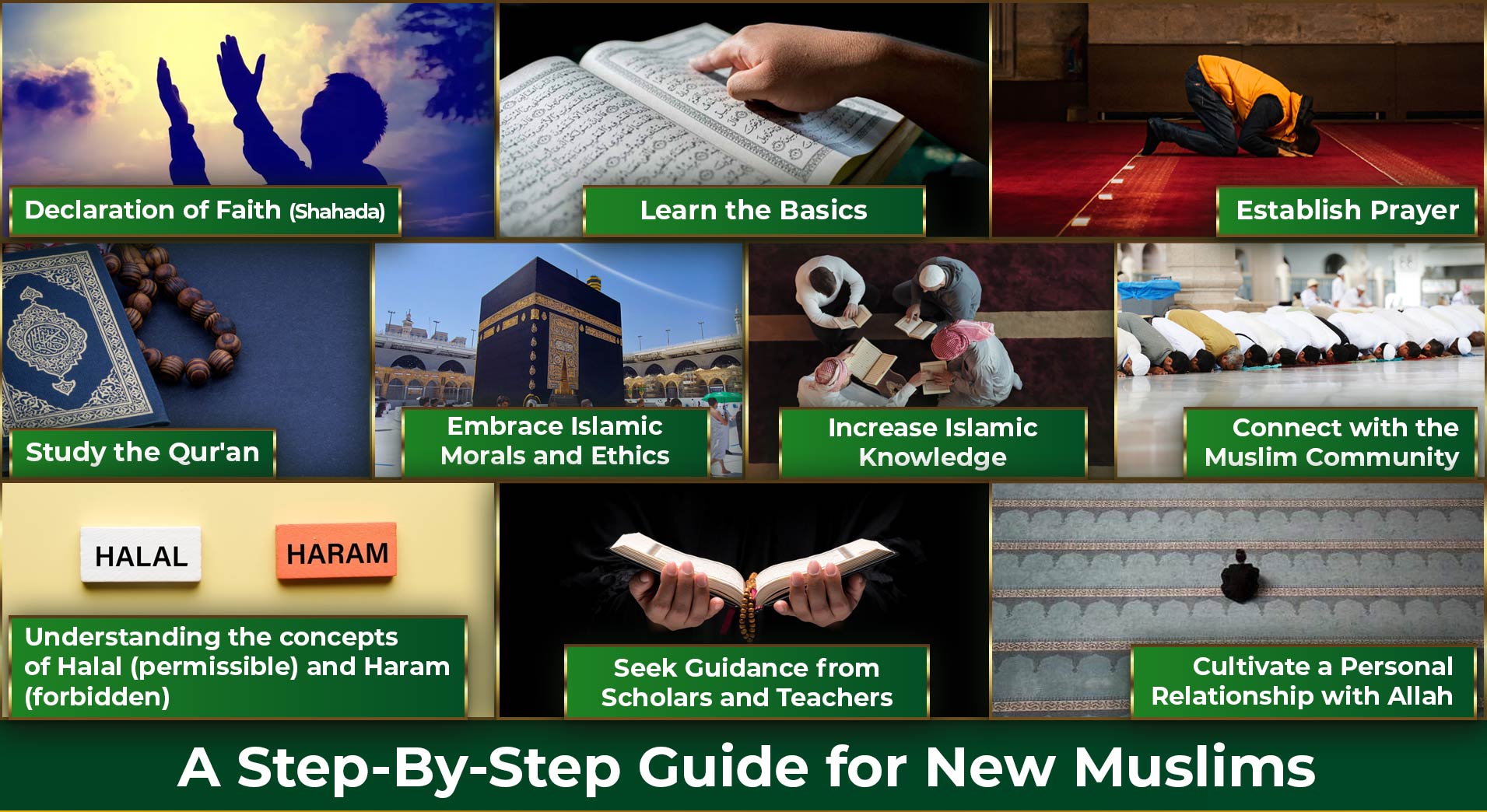Here is a step-by-step guide to help new Muslims navigate their journey in Islam
Step 1: Declaration of Faith (Shahada)
The first and most important step is to declare the Shahada, the testimony of faith. Utter the words with sincerity and conviction: “Ash-hadu an la ilaha illa Allah, wa ash-hadu anna Muhammadan rasulullah” (I bear witness that there is no deity worthy of worship except Allah, and I bear witness that Muhammad is His messenger). By reciting the Shahada, you affirm your belief in the oneness of Allah and the prophethood of Muhammad (peace be upon him).
Step 2: Learn the Basics
Start by learning the basic beliefs of Islam, such as the articles of faith (e.g., belief in Allah, the angels, the books, the prophets, the Day of Judgment, and predestination). Study the pillars of Islam and the pillars of faith. Familiarize yourself with the core principles and concepts of the religion.
Step 3: Establish Prayer
Begin incorporating prayer into your daily routine. Learn the proper method of performing ablution (wudu) and the five daily prayers (Salat). Seek guidance from knowledgeable individuals or attend prayer workshops at your local mosque to understand the required movements and recitations.
Step 4: Study the Qur’an
Begin reading and studying the Qur’an, the holy book of Islam. Start by reading translations in your native language to understand the message and teachings. Seek explanations and interpretations from reliable sources to deepen your understanding.
Step 5: Embrace Islamic Morals and Ethics
Learn about the moral and ethical teachings of Islam. Study the life and teachings of Prophet Muhammad (peace be upon him) through Hadith collections. Strive to embody virtues such as honesty, kindness, compassion, and integrity in your interactions with others.
Step 6: Increase Islamic Knowledge
Engage in continuous learning by attending Islamic classes, lectures, and seminars. Explore various topics, including jurisprudence, Islamic history, spirituality, and the life of the Prophet. Utilize online resources, books, and reputable scholars to expand your knowledge.
Step 7: Connect with the Muslim Community
Engage with the Muslim community to foster a sense of belonging and gain support on your journey. Attend congregational prayers at the mosque, participate in community events, and seek out mentors or study circles to enhance your understanding and build relationships.
Step 8: Seek Guidance from Scholars and Teachers
Connect with knowledgeable individuals, scholars, or teachers who can provide guidance and answer your questions. Seek clarification on matters of Islamic practice, beliefs, and spirituality. It is important to rely on trusted sources to ensure accurate information.
Step 9: Cultivate a Personal Relationship with Allah
Devote time to personal reflection, supplication, and remembrance of Allah. Develop a habit of engaging in individual acts of worship, such as voluntary prayers, reading Qur’an, and making personal du’a (supplications). Strive to build a close and personal relationship with Allah.
Step 10: Understanding the concepts of Halal (permissible) and Haram (forbidden)
As a new Muslim, one must know what Halal and Haram are. Halal refers to what is permissible and lawful according to Islamic principles. It encompasses various aspects of life, including food, beverages, clothing, finance, and behavior. On the contrary, Haram refers to what is forbidden or prohibited in Islam. It involves sinful actions, behaviors, and substances that should be avoided.
Remember that everyone’s journey in Islam is unique. Embrace Islam at your own pace, seek knowledge, and focus on developing a sincere and heartfelt connection with Allah. There are online institutes and resources easily accessible that help people in learning Islam. QTVtutor is one of those platforms that provide comprehensive and structured courses designed for individuals who are new to Islam or seeking to deepen their knowledge of the religion.
By enrolling in courses at QTVtutor, you will have access to qualified Islamic scholars and teachers who can guide you through the various aspects of Islam. They offer courses on topics such as the fundamentals of Islam, Quranic studies, Islamic beliefs and practices, and the life and teachings of Prophet Muhammad. These courses will help you gain a solid foundation in understanding Islam and its principles.
Whether you are a new Muslim or someone seeking to explore and understand Islam before making a decision, QTVtutor provides a supportive and educational environment to aid you in your journey. Their resources and knowledgeable instructors will assist you in gaining a deeper understanding of Islam’s teachings, practices, and principles.
 0203-002-6366
0203-002-6366
 1-212-381-1055
1-212-381-1055 61-3-8820-5043
61-3-8820-5043  021-111-279-111
021-111-279-111




